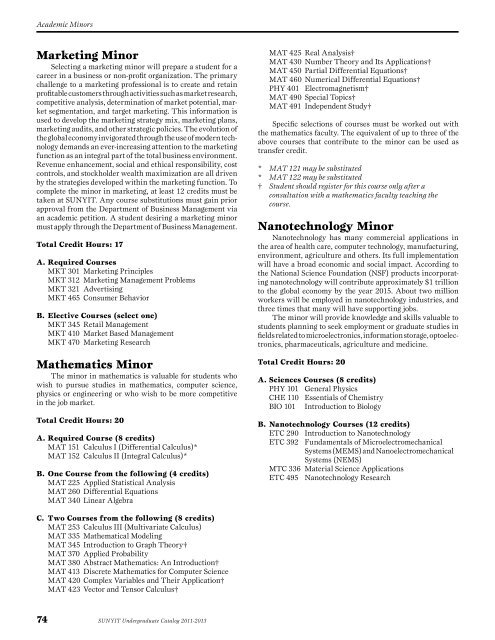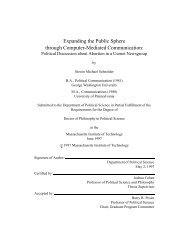Undergraduate Catalog 2011-2013 - SUNY Institute of Technology
Undergraduate Catalog 2011-2013 - SUNY Institute of Technology
Undergraduate Catalog 2011-2013 - SUNY Institute of Technology
You also want an ePaper? Increase the reach of your titles
YUMPU automatically turns print PDFs into web optimized ePapers that Google loves.
Academic Minors<br />
Marketing Minor<br />
Selecting a marketing minor will prepare a student for a<br />
career in a business or non-pr<strong>of</strong>it organization. The primary<br />
challenge to a marketing pr<strong>of</strong>essional is to create and retain<br />
pr<strong>of</strong>itable customers through activities such as market research,<br />
competitive analysis, determination <strong>of</strong> market potential, market<br />
segmentation, and target marketing. This information is<br />
used to develop the marketing strategy mix, marketing plans,<br />
marketing audits, and other strategic policies. The evolution <strong>of</strong><br />
the global economy invigorated through the use <strong>of</strong> modern technology<br />
demands an ever-increasing attention to the marketing<br />
function as an integral part <strong>of</strong> the total business environment.<br />
Revenue enhancement, social and ethical responsibility, cost<br />
controls, and stockholder wealth maximization are all driven<br />
by the strategies developed within the marketing function. To<br />
complete the minor in marketing, at least 12 credits must be<br />
taken at <strong>SUNY</strong>IT. Any course substitutions must gain prior<br />
approval from the Department <strong>of</strong> Business Management via<br />
an academic petition. A student desiring a marketing minor<br />
must apply through the Department <strong>of</strong> Business Management.<br />
Total Credit Hours: 17<br />
A. Required Courses<br />
MKT 301 Marketing Principles<br />
MKT 312 Marketing Management Problems<br />
MKT 321 Advertising<br />
MKT 465 Consumer Behavior<br />
B. Elective Courses (select one)<br />
MKT 345 Retail Management<br />
MKT 410 Market Based Management<br />
MKT 470 Marketing Research<br />
Mathematics Minor<br />
The minor in mathematics is valuable for students who<br />
wish to pursue studies in mathematics, computer science,<br />
physics or engineering or who wish to be more competitive<br />
in the job market.<br />
Total Credit Hours: 20<br />
A. Required Course (8 credits)<br />
MAT 151 Calculus I (Differential Calculus)*<br />
MAT 152 Calculus II (Integral Calculus)*<br />
B. One Course from the following (4 credits)<br />
MAT 225 Applied Statistical Analysis<br />
MAT 260 Differential Equations<br />
MAT 340 Linear Algebra<br />
MAT 425 Real Analysis†<br />
MAT 430 Number Theory and Its Applications†<br />
MAT 450 Partial Differential Equations†<br />
MAT 460 Numerical Differential Equations†<br />
PHY 401 Electromagnetism†<br />
MAT 490 Special Topics†<br />
MAT 491 Independent Study†<br />
Specific selections <strong>of</strong> courses must be worked out with<br />
the mathematics faculty. The equivalent <strong>of</strong> up to three <strong>of</strong> the<br />
above courses that contribute to the minor can be used as<br />
transfer credit.<br />
* MAT 121 may be substituted<br />
* MAT 122 may be substituted<br />
† Student should register for this course only after a<br />
consultation with a mathematics faculty teaching the<br />
course.<br />
Nanotechnology Minor<br />
Nanotechnology has many commercial applications in<br />
the area <strong>of</strong> health care, computer technology, manufacturing,<br />
environment, agriculture and others. Its full implementation<br />
will have a broad economic and social impact. According to<br />
the National Science Foundation (NSF) products incorporating<br />
nanotechnology will contribute approximately $1 trillion<br />
to the global economy by the year 2015. About two million<br />
workers will be employed in nanotechnology industries, and<br />
three times that many will have supporting jobs.<br />
The minor will provide knowledge and skills valuable to<br />
students planning to seek employment or graduate studies in<br />
fields related to microelectronics, information storage, optoelectronics,<br />
pharmaceuticals, agriculture and medicine.<br />
Total Credit Hours: 20<br />
A. Sciences Courses (8 credits)<br />
PHY 101 General Physics<br />
CHE 110 Essentials <strong>of</strong> Chemistry<br />
BIO 101 Introduction to Biology<br />
B. Nanotechnology Courses (12 credits)<br />
ETC 290 Introduction to Nanotechnology<br />
ETC 392 Fundamentals <strong>of</strong> Microelectromechanical<br />
Systems (MEMS) and Nanoelectromechanical<br />
Systems (NEMS)<br />
MTC 336 Material Science Applications<br />
ETC 495 Nanotechnology Research<br />
C. Two Courses from the following (8 credits)<br />
MAT 253 Calculus III (Multivariate Calculus)<br />
MAT 335 Mathematical Modeling<br />
MAT 345 Introduction to Graph Theory†<br />
MAT 370 Applied Probability<br />
MAT 380 Abstract Mathematics: An Introduction†<br />
MAT 413 Discrete Mathematics for Computer Science<br />
MAT 420 Complex Variables and Their Application†<br />
MAT 423 Vector and Tensor Calculus†<br />
74 <strong>SUNY</strong>IT <strong>Undergraduate</strong> <strong>Catalog</strong> <strong>2011</strong>-<strong>2013</strong>
















